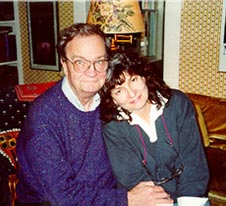When death, as public as a President or as private as a lover, overwhelms us, it speaks itself in elegy’s necropoetics.
I recently read Donald Hall's article in The New Yorker, "The Poetry of Death." It sounds like a real downer, but I recommend that you give it a read.
Many readers of this blog probably know that Donald Hall was married to Jane Kenyon and that they shared a life of poetry.
Jane Kenyon and I almost avoided marriage because her widowhood would have been so long, between us was there such a radical difference in age. And yet today it is twenty-two years since she died, of leukemia, at forty-seven—and I approach ninety...
I heard the two of them talk about their shared life in poetry in a session at a Dodge Poetry Festival a few decades ago. That was before Jane was diagnosed with leukemia.
We inhabited not the natural world but the landscape of leukemia. I read a draft of “Without” to Jane. From her bed, Jane said, “You’ve got it, you’ve got it!” A year later, I put the poem into the past tense, and eventually it became the title of my book of Jane’s death.But poets know that death plays a big role if poetry. It is aprt of poetry history and all poets eventually deal with the topic in their poems.
Poetry begins with elegy, in extremity, as Gilgamesh laments the death of his companion Enkidu, watching worms crawl out of Enkidu’s neck. Homer sings of heroes as they die in battle, and Priam weeps to see the body of his son Hector dragged around the walls of Troy. Virgil follows Aeneas from the graveyard of Troy to the founding of Rome, Dido’s pyre flaming on the way. In the fifteenth century, poetry emigrated from Chaucer’s England north to the Scots, where William Dunbar wrote his elegy for the makers—in Greek, a poet is a “maker”—and grieved over twenty-five dead and dying Scots poets.





